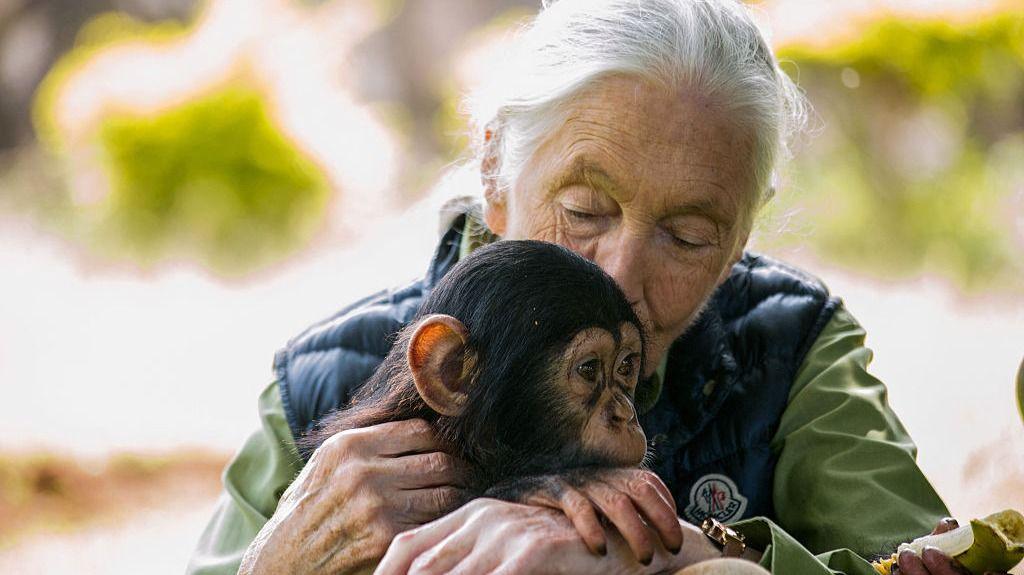“`html
Dame Jane Goodall, the globally renowned conservationist and foremost expert on chimpanzees, has died at the age of 91.
Her groundbreaking observations profoundly illuminated the close evolutionary relationship between humans and chimpanzees. Moreover, she dedicated her life to tireless efforts in support of conservation initiatives worldwide.
Dr. Goodall passed away due to natural causes while in California, during a speaking tour across the United States, according to a statement released by the Jane Goodall Institute.
The Institute stated that her discoveries “revolutionized science” and hailed her as “a tireless advocate for the protection and restoration of our natural world.”
The United Nations expressed its deep sorrow at the loss of Dr. Goodall, acknowledging her dedication as she “worked tirelessly for our planet and all its inhabitants, leaving an extraordinary legacy for humanity and nature.”
Greenpeace conveyed its “heartbreak” at her passing, describing her as “one of the true conservation giants of our time.”
Will McCallum, co-executive director of Greenpeace UK, stated, “Dr. Goodall’s legacy extends beyond science; it lies in the global movement she helped ignite to protect nature and foster hope for a better world.”
Naturalist Chris Packham, speaking to the BBC, counted her among his personal heroes, calling her “revolutionary” and “remarkable.”
“To have lost a hero at a time when we need all of them on the frontline fighting for life on earth is a tragedy.”
Born in 1934 and raised in London, Dr. Goodall attributed her lifelong fascination with animals to formative reading experiences with books such as The Story of Dr. Doolittle and Tarzan.
In her mid-twenties, she encountered the prominent primatologist Prof. Louis Leakey while staying on a friend’s farm in Kenya. Despite lacking formal qualifications, Mr. Leakey recognized her potential and facilitated her initial research expedition to the Tanzanian jungles in 1960.
That year, she made a landmark observation, becoming the first individual to document an animal utilizing a tool – a large male chimpanzee, whom she had named David Greybeard, extracting termites from a mound with a stick.
Until that point, such tool use was considered exclusive to humans. Her observations challenged prevailing scientific paradigms and significantly shaped the trajectory of evolutionary science.
Her work was published in leading scientific journals, and in 1965, she graced the cover of National Geographic, introducing the world to the complex emotional and social lives of primates.
She revealed the formation of strong family bonds among chimpanzees and even their engagement in territorial warfare. She also featured in a television documentary narrated by Orson Welles, which saw her playing and wrestling with baby chimps.
Her approach – developing close relationships with the animals she studied, naming them, and referring to them as “my friends” – was met with skepticism by some, predominantly male, scientists at the time. She nonetheless pursued a PhD based on her findings, despite not holding an undergraduate degree or any prior scientific training.
Drawing from her field experiences, she transitioned to activism, advocating for the liberation of chimpanzees held in zoos or captivity for medical research, and later urging action on climate change in response to widespread habitat destruction.
She told the BBC in 2024: “We’re in the midst of the sixth great extinction… the more we can do to restore nature and protect existing forests, the better.”
When asked about her enduring motivation, she responded: “Surely people want a future for their children.”
Her Jane Goodall Institute, established in 1977, is dedicated to the protection of chimpanzees and supports initiatives focused on benefiting both animals and the environment.
Dr. Goodall was appointed a Dame in 2003 and received the US Presidential Medal of Freedom in 2025.
She was renowned for her constant travel in service of her work, noting in a 2022 interview with the Times newspaper that she had not slept in the same bed for more than three weeks consecutively since 1986.
Dr. Goodall remained active until her death, participating in an on-stage interview in New York just one week prior. She was scheduled to speak again at a sold-out event on October 3rd in California.
The Duke and Duchess of Sussex have paid tribute to Dr. Goodall, describing her as a “tireless advocate” for the protection of nature.
“Dr. Jane Goodall DBE was a visionary humanitarian, scientist, friend to the planet, and friend to us,” Prince Harry and Meghan said in a statement.
Actor and environmental campaigner Leonardo DiCaprio called her “a true hero for the planet”.
“For decades, Jane travelled the world with tireless energy, awakening generations to the wonder of the natural world,” DiCaprio said.
“She inspired millions to care, to act, and to hope.”
Former Canadian prime minister, Justin Trudeau, said “her compassion will live on” in future conservation work.
Environmental organisations, including Greenpeace and People for the Ethical Treatment of Animals (Peta), have also commemorated Dr Goodall’s legacy.
Advice against bathing has been removed for Portstewart Strand and Downhill.
Thirty four sheep, worth £5,000, have died on Geraint Davies’ farm – after a bumper year for acorns.
Nathan Slate’s collection is a commentary on environmental issues, inspired by the English countryside.
Cornwall Wildlife Trust is to begin a temperate rainforest restoration project at its 150-acre site near Looe.
This year marks 20th anniversary of the poll which raises awareness for native species considered to be at risk.
“`

